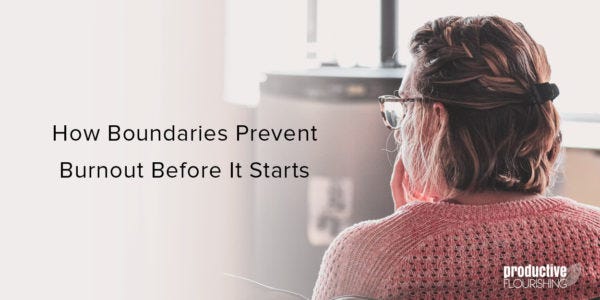How Boundaries Prevent Burnout Before It Starts
We live in a society that's constantly busy. Whether we're dealing with the stress of managing our ever-changing schedules or just the general ups and downs of life in the working world, one thing is abundantly clear: we are collectively feeling burned out.
We’ve talked about burnout before, and how it can manifest itself in our emotions and energy. With these feelings of burnout, you may also be overcommitting to projects beyond your own available sense of time and energy or have been “ghosting” people who have then become frustrated with you since you’ve lacked the energy to keep up your commitments with them.
While it’s good to incorporate self-care and relaxation activities into your routine, it’s also important to address these burnout issues at their root cause: boundaries. Or rather, your lack thereof. So, how can you better set boundaries to manage your own expectations, and the expectations of those around you? Read on for some strategies that will help.
Communicating Your Project Debt
If you find yourself overburdened and overwhelmed by all the projects and commitments you’ve agreed to, it’s likely because you haven’t set proper boundaries with the people in your life. If you’ve found yourself at this point, you can consider yourself in project and commitment debt.
You can think about project debt much like financial debt, except the currency is time instead of money. Being overcommitted to projects is much like being way over your head in literal financial debt. When you’ve gotten yourself into deep financial debt, the way out invariably includes difficult conversations with your lenders about your current situation and negotiating a different structure or timeline for repayment. If you’ve gotten yourself into a similar level of project debt, you’ll have to have similar uncomfortable conversations — apologizing to people who you’ve made commitments to and, likely, renegotiating or even backing out of some committed projects.
Here are a few things to consider when having these conversations:
Make the proper time and space to have this conversation, and explain how your current commitments have evolved and how this change has affected your capacity to help out.
Think about the type of relationship you have with the person and the expectations that are currently in place. Is it possible that you could renegotiate timelines, or delegate the project to someone else?
Listen, and work together to reset expectations, timelines, and deadlines.
You may feel hesitant about being direct with people or fearful about letting them down but remember: we often underestimate how excited other people can be for us. They may be really happy to see the changes that are happening in our lives. They may also be grateful for the boundary that you’re setting and empowered to set their own boundaries.
Telling people no after you’ve already committed to something is highly unpleasant; there’s no denying that. Consider it a learning experience, and an incentive to set clearer and stricter boundaries. Plus, project debt is something that can ultimately be avoided with better boundaries going forward.
The “No Diet”
Once you’ve learned the hard lesson project debt teaches — maybe having to put your tail between your legs a few times — you’ll recognize the importance of setting better boundaries for yourself in the first place. Setting strict boundaries is difficult, but gets easier as you become more attuned to your energy levels and capacity. One technique for applying better boundaries is the No Diet.
It’s simple, but not easy: you just have to learn to say no more often.
Following a No Diet for new projects and commitments may be useful for you as you learn to set boundaries and take the time to re-evaluate your priorities and relationships. This means that you honor commitments that you’ve already made, but you don’t make any new ones. For example, for the next six to eight weeks, tell yourself that you’re going to be very careful about saying “yes” to any new projects (and remember, personal projects count here, too), such as planning out a new workshop for your clients, or writing a guest post on your colleague’s blog, or helping another friend plan a party. Your default answer may have to be a loving “no.”
Choose a version of “no” that fits you, and practice saying it so the words come out smoothly and easily when you’re faced with your next potential commitment. You might say something like, “I’m honored you asked me, but I’m already fully committed right now, and don’t think I can do justice to the opportunity” (in whatever style best fits you).
When you’re overcommitted, it’s easier to go on a No Diet and use that time to tie up any loose ends and re-evaluate your priorities going forward. During those six to eight weeks, people often use this extra time to catch up on their current projects, invest time in hobbies that re-charge them, or simply take the extra time to spend resting in whatever unique way that looks like for them (remember: rest is productive!).
However, with society often encouraging us to believe that our self-value is dependent on our productivity, you may start feeling guilty about not saying “yes” to or being actively involved in everything. But go easy on yourself. This feeling of being perpetually burned out may be the “new normal,” but it’s also unsustainable – and often unnecessary. It is possible to live your life with ease while also pushing your projects forward, advancing your career or growing your business, and taking care of your family.
When you’re feeling burned out, it’s important to take some time to re-evaluate your priorities and reset expectations with the people in your life. Take a deep breath, prepare for some important conversations to reset your project load, and then set strong boundaries going forward. (Tweet this.)





